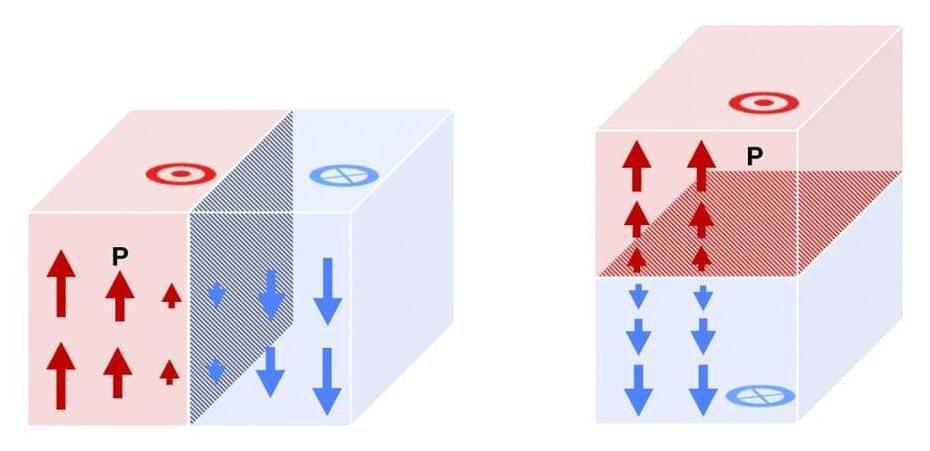At Davos, a Duke University futurist spoke in glowing terms about the promise of ‘brain transparency’ – and downplayed the obvious dystopian risks.




For all of the unparalleled, parallel-processing, still-indistinguishable-from-magic wizardry packed into the three pounds of an adult human brain, it obeys the same rule as the other living tissue it controls: Oxygen is a must.
So it was with a touch of irony that Evgeny Tsymbal offered his explanation for a technological wonder—movable, data-covered walls mere atoms wide—that may eventually help computers behave more like a brain.
“There was unambiguous evidence that oxygen vacancies are responsible for this,” said Tsymbal, George Holmes University Professor of physics and astronomy at the University of Nebraska–Lincoln.

Triple-negative breast cancer accounts for approximately 15% of all breast cancer cases. Patients with this subtype typically have poorer outcomes compared to other breast cancers, suggesting the need for improved treatments. One new therapy being investigated at Moffitt Cancer Center involves oncolytic viruses, which infect and kill the cancer cells. In a new article published in Nature Medicine, the researchers, led by Hatem Soliman, M.D., share results from a phase 2 clinical trial of the oncolytic virus talimogene laherparepvec (TVEC) combined with standard chemotherapy in patients with early stage triple-negative breast cancer.
Patients with triple-negative breast cancer lack expression of the estrogen and progesterone receptors and have little to no expression of the protein HER2. As a result, hormone therapy and medicines that target HER2 protein receptors are not effective against this type of cancer. Standard therapy for early stage triple-negative breast cancer has been cytotoxic chemotherapy with the recent addition of pembrolizumab. However, this approach is associated with significant side effects. Many studies have shown that patients who have higher levels of immune cells within their tumors tend to have better responses to therapy. These observations suggest that agents that stimulate the immune system may be beneficial in triple-negative breast cancer.
TVEC is a modified herpes simplex 1 virus that includes coding sequences for the protein GM-CSF, which can stimulate the immune system. It is injected directly into the tumor and undergoes replication within the tumor cells, resulting in the breakdown of the tumor cell and production of tumor derived antigens. Immune cells can recognize the antigens, infiltrate the tumor and target the cancer cells for destruction. In addition, GM-CSF made by the virus acts as a beacon to help recruit immune cells to the tumor.

“When we put everything together, we saw drops in brightness that were not caused by Quaoar, but that pointed to the presence of material in a circular orbit around it,” said Bruno Morgado of the Universidade Federal do Rio de Janeiro in a statement. “The moment we saw that we said, ‘Okay, we are seeing a ring around Quaoar.’”
Quaoar is part of a collection of about 3,000 dwarf planets known as trans-Neptunian objects, which are beyond the orbit of the planet Neptune.
Scientists are now wondering why the dense material in Quaoar’s ring has not come together to form a small moon, because the ring itself is “at a distance of almost seven and a half times the radius of Quaoar,” the ESA said.



When dying stars explode as supernovae, they usually eject a chaotic web of dust and gas. But a new image of a supernova’s remains looks completely different — as though its central star sparked a cosmic fireworks display. It is the most unusual remnant that researchers have ever found, and could point to a rare type of supernova that astronomers have long struggled to explain.
“I have worked on supernova remnants for 30 years, and I’ve never seen anything like this,” says Robert Fesen, an astronomer at Dartmouth College in Hanover, New Hampshire, who imaged the remnant late last year. He reported his findings at a meeting of the American Astronomical Society on 12 January and posted them in a not-yet-peer-reviewed paper on the same day.
An exploration of 8 New Alien Signal SETI Candidates and how they were detected through machine learning technology in previously collected data.
Event Horizon Interview with Dr. Jerry Ehman:
My Patreon Page:
https://www.patreon.com/johnmichaelgodier.
My Event Horizon Channel:
https://youtube.com/watch?v=LT6oj2dYS7Q&feature=share
The Twilight Zone — Season One, Episode Fourteen — Third from the Sun, with Fritz Weaver, Joe Moross, Edward Andrews, Lori March, Denise Alexander, and Jeanne Evans.
Video and additional content added.